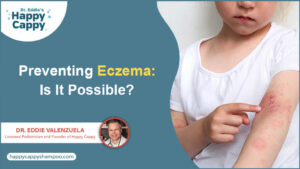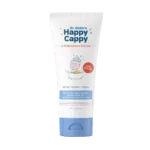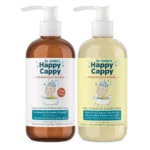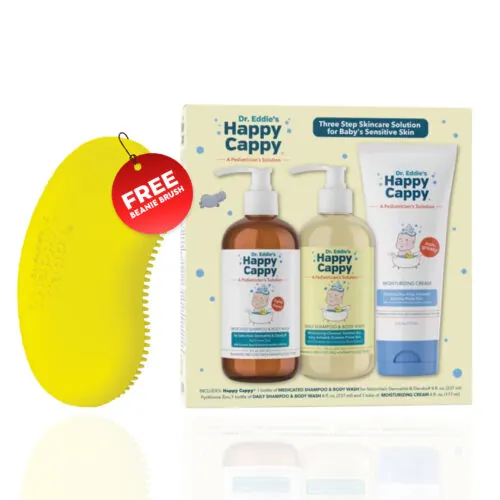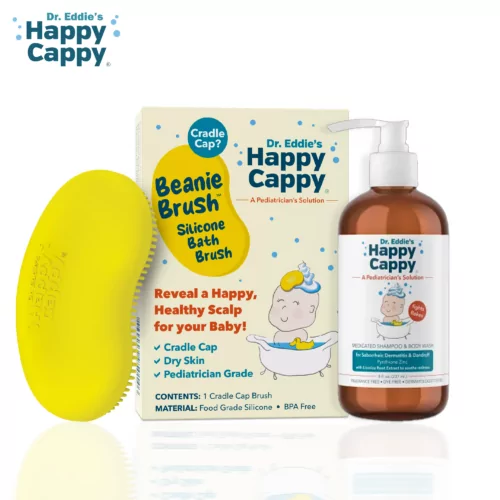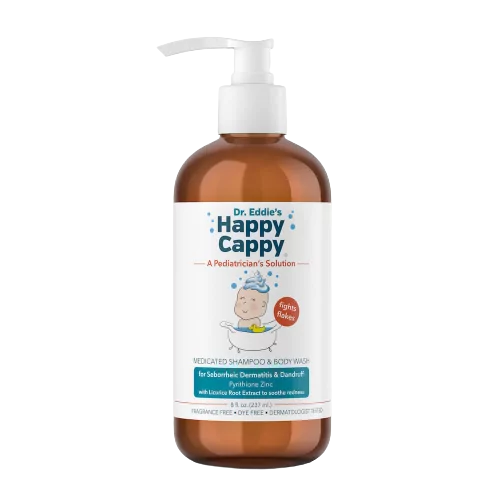Anyone who has young children who suffer from eczema can understand the frustration that comes with watching their child helplessly scratch and itch at their skin during a flare-up. Atopic dermatitis, the most common type of eczema, is found in roughly 10 million children under the age of 18 across the U.S., with most of those kids scratching at their skin well before the age of 5.
With limited treatment options and medical understanding of the causes of eczema, this can leave many families frustrated and wondering, “can eczema be prevented?”
Can Eczema Be Prevented?
While there isn’t a cure for eczema, and researchers aren’t yet exactly sure what causes this skin condition, there are strategies that have been considered helpful to patients in preventing eczema and its flare-ups. Not all methods for atopic dermatitis prevention are guaranteed to work for every patient, but they have helped many find relief from non-stop itching.
The key to eczema prevention starts with trying to understand common factors that can bring on a flare-up and eliminating or correcting those culprits.
What Causes Eczema Flare-ups?
Many doctors agree that the most common triggers for an eczema flare-up include:
- Rough or heavy clothing
- Extreme temperature
- Humidity
- Dry Skin
- Harsh shampoos and body washes
- Stress
- Allergens
- Irritants
- Food allergies
How To Prevent Eczema Flare-up?
Eczema flare-ups can be prevented by following a few simple steps:
1. Develop a Proper Skincare Routine
Developing a proper skincare routine is the best way to manage eczema and prevent future flare-ups. The first step in an eczema skincare routine should be cleansing.
- Cleanse the skin at least once daily with an eczema shampoo that can also be used as a body wash and face wash.
The next step is moisturizing.
- Moisturize your skin at least twice with an eczema cream daily to avoid dry skin. If you feel that your skin is getting dry more often, moisturize it as much as you want. But make sure to use a moisturizing cream that is hypoallergenic and free from harsh chemicals.
2. Moderate Temperature
Exposure to extreme temperature differences is believed to contribute to eczema breakouts. This can be particularly difficult in winter months when we are often moving from cold conditions outdoors to extremely warm rooms indoors.
- Combat this by layering up before heading outdoors and lowering indoor temperatures to comfortable, but not too warm temperatures.
- Keep your skin moisturized with an eczema cream as much as possible in the winter, cold air can dry the skin more often.
- Use a humidifier inside the house to keep the air moist.
3. Chose The Right Clothing
The wrong clothing, for example, can exacerbate eczema rash. Avoid rough, scratchy, tight clothes and fabrics like wool and non-breathable synthetics.
- Wearing loose, cotton clothing, or clothing made from other natural and soft materials, may provide more comfort.
- It’s also important to watch how you wash clothing. Invest in laundry detergents that are free of harsh ingredients or that are specially designed for sensitive skin.
4. Keep skin moisturized
Moisturizing may seem like an obvious step to prevent those dry, scaling patches of skin, but there is more to moisturized skin than applying creams.
- Using an irritant-free moisturizing eczema cream or ointment two times per day can reduce flare-ups.
- Shortly after bathing, is the best time for the moisturizer to be applied.
- Moisturize your hands and face every time after washing.
Following these practices can reduce the need for steroid use on the skin, and bring a world of relief to your baby.
5. Bathtime Care
- Avoid hot showers and baths, which can extract moisture from the skin.
- Keep your bathtime short – about 5 to 10 minutes especially if you are taking a bath daily.
- Don’t scrub your skin with a washcloth or loofah.
- After taking a bath, pat dry your skin instead of rubbing it.
- Applying an eczema cream or moisturizer within three minutes of exiting a bath can help to optimize moisture levels.
- Some soaps may also strip the body of its natural oils and can even cause irritants that could spur an outbreak. So use a body wash instead of soap. A body wash that does not contain any fragrances, paraben, or sulfate.
6. Right Products For Eczema
Many soaps contain harsh, synthetic ingredients that can irritate even normal skin. These ingredients can be extremely problematic for those who suffer from eczema and other sensitive skin conditions.
Even some shampoos that are designed for eczema may be too strong for children. Instead, switch to an eczema shampoo for kids that is formulated with natural ingredients. You may also consider using a daily eczema body wash.
Make sure the eczema products you are using are free from any harsh chemicals like:
- Fragrances
- Alcohol
- Paraben
- Sulfates
- Phthalates
Eczema products that have a low pH can help reduce the symptoms of eczema by normalizing the skin’s pH level.
7. Avoid Allergens or Irritants
Some breakout-causing triggers may be unique to your child. This can include allergies to pollen, mold, dust mites, pet dander, or rarely certain foods. If your child suffers from repeated bouts of eczema, try to monitor what they consume or come into contact with in the days leading up to their outbreak and eliminate any factors that are always present at the time of a flare-up.
8. Don’t Scratch
Itching is the most prominent symptom of eczema. In some cases, it can also cause severe itching. You may feel like scratching your skin but Don’t Do That. Scratching the irritated skin can lead to a never-ending itch-scratch cycle that can cause infection and scarring. If you are having a severe urge to scratch then pat the area instead of scratching.
9. Manage Stress
If your eczema flares up because of stress then it is important to manage it. You can manage stress by practicing breathing techniques, yoga, and exercise.
These are all small but important steps that can prevent flare-ups and provide real relief from the irritation of eczema in children and adults.
Eczema Treatment
If you are looking for relief for your child, try incorporating Dr. Eddie’s Happy Cappy Daily Shampoo & Body Wash into your child’s daily skincare routine. Made with 95% natural plant-based ingredients, this is the only shampoo that helps soothe eczema symptoms and is also formulated for children of all ages.
Moisturize the affected area with Happy Cappy Moisturizing Cream For Eczema. It contains natural ingredients like licorice root extract that help reduce itching and redness.
If your eczema does not get better with a proper skincare routine or is getting worse then consult a doctor they may prescribe the use of topical steroids, antihistamines, corticosteroids, calcineurin inhibitors, or wet wrap therapy.
Key Takeaways
There is no permanent cure for eczema but it can be easily managed and prevented by taking proper care of the skin such as:
- Keeping the skin clean.
- Keep it moisturized with an eczema cream.
- Avoiding possible allergens and irritants.
- Don’t scratch the affected area.
- Choose products for your skin that are free from harsh chemicals, contain natural ingredients, and have a low pH level.
FAQs
Can you prevent eczema from developing?
Yes, the best way to prevent eczema flare-ups from developing is by avoiding allergens, keeping the body at a moderate temperature, wearing light cotton clothing, keeping your skin clean with the help of eczema shampoo and body wash, and moisturizing with an eczema cream.
Can food cause eczema?
Particular foods may trigger an eczema flare-up, especially if your body is allergic to nuts or milk.
Can weather affect eczema?
Yes, the weather has a significant impact on eczema. If you are already experiencing eczema, extreme cold or hot weather can further dry your skin and worsen the condition.
How to prevent eczema itching during the nighttime?
Eczema can be very irritating and itchy during the night when you go to sleep. So, to sleep comfortably, try moisturizing your skin with eczema cream before bed. Use pajamas and bedsheets made of cotton, and keep the temperature of your room cool.
Can itching eczema make it worse?
People who have experienced eczema know that it can sometimes get very itchy. Scratching the affected area may provide satisfaction for a few minutes, but it will worsen the condition. So always remember to avoid scratching the itch, as it can also lead to scars and skin infections.

